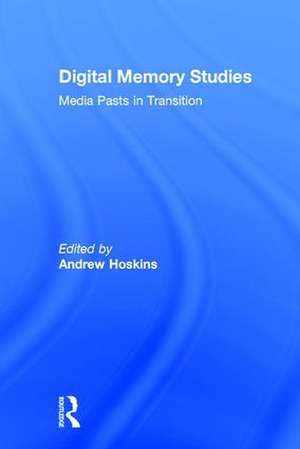Digital Memory Studies: Media Pasts in Transition
Editat de Andrew Hoskinsen Limba Engleză Hardback – 25 sep 2017
Digital Memory Studies seizes this challenge and pioneers an agenda that interrogates concepts, theories and histories of media and memory studies, to map a holistic vision for the study of the digital remaking of memory.
Through the lenses of connectivity, archaeology, economy, and archive, contributors illuminate the uses and abuses of the digital past via an array of media and topics, including television, videogames and social media, and memory institutions, network politics and the digital afterlife.
| Toate formatele și edițiile | Preț | Express |
|---|---|---|
| Paperback (1) | 375.90 lei 6-8 săpt. | |
| Taylor & Francis – 25 sep 2017 | 375.90 lei 6-8 săpt. | |
| Hardback (1) | 1218.08 lei 6-8 săpt. | |
| Taylor & Francis – 25 sep 2017 | 1218.08 lei 6-8 săpt. |
Preț: 1218.08 lei
Preț vechi: 1485.47 lei
-18% Nou
Puncte Express: 1827
Preț estimativ în valută:
233.15€ • 253.34$ • 195.98£
233.15€ • 253.34$ • 195.98£
Carte tipărită la comandă
Livrare economică 21 aprilie-05 mai
Preluare comenzi: 021 569.72.76
Specificații
ISBN-13: 9781138639379
ISBN-10: 1138639370
Pagini: 326
Dimensiuni: 152 x 229 x 19 mm
Greutate: 0.45 kg
Ediția:1
Editura: Taylor & Francis
Colecția Routledge
Locul publicării:Oxford, United Kingdom
ISBN-10: 1138639370
Pagini: 326
Dimensiuni: 152 x 229 x 19 mm
Greutate: 0.45 kg
Ediția:1
Editura: Taylor & Francis
Colecția Routledge
Locul publicării:Oxford, United Kingdom
Public țintă
Postgraduate and UndergraduateCuprins
1: Andrew Hoskins: The Restless Past: An Introduction to Digital Memory and Media
Section 1: Connectivity
2: Martin Pogačar: Culture of the Past: Digital Connectivity and Dispotentiated Futures
3: Amanda Lagerkvist: The Media End: Digital Afterlife Agencies and Techno-existential Closure
4: Andrew Hoskins: Memory of the Multitude: The End of Collective Memory
5: Wulf Kansteiner: The Holocaust in the 21st Century: Digital Anxiety, Cosmopolitanism on Steroids, and Never Again Genocide without Memory
Section 2: Archaeology
6: Wolfgang Ernst: Tempor(e)alities and Archive-Textures of Media-Connected Memory
7: Jussi Parikka: The Underpinning Time: From Digital Memory to Network Microtemporality
8: Timothy Barker: Television In and Out of Time
9: Matthew Allen: Memory in Technoscience: Biomedia and the Wettability of Mnemonic Relations
Section 3: Economy
10: Joanne Garde-Hansen and Gilson Schwartz: Iconomy of Memory: On Remembering as Digital, Civic and Corporate Currency
11: Anna Reading and Tanya Notley: ‘Globital' Memory Capital: Exploring Digital Memory Economies
Section 4: Archive
12: Michael Moss: Memory Institutions, the Archive and Digital Disruption?
13: Debra Ramsay: Tensions in the Interface: The Archive and the Digital
Section 1: Connectivity
2: Martin Pogačar: Culture of the Past: Digital Connectivity and Dispotentiated Futures
3: Amanda Lagerkvist: The Media End: Digital Afterlife Agencies and Techno-existential Closure
4: Andrew Hoskins: Memory of the Multitude: The End of Collective Memory
5: Wulf Kansteiner: The Holocaust in the 21st Century: Digital Anxiety, Cosmopolitanism on Steroids, and Never Again Genocide without Memory
Section 2: Archaeology
6: Wolfgang Ernst: Tempor(e)alities and Archive-Textures of Media-Connected Memory
7: Jussi Parikka: The Underpinning Time: From Digital Memory to Network Microtemporality
8: Timothy Barker: Television In and Out of Time
9: Matthew Allen: Memory in Technoscience: Biomedia and the Wettability of Mnemonic Relations
Section 3: Economy
10: Joanne Garde-Hansen and Gilson Schwartz: Iconomy of Memory: On Remembering as Digital, Civic and Corporate Currency
11: Anna Reading and Tanya Notley: ‘Globital' Memory Capital: Exploring Digital Memory Economies
Section 4: Archive
12: Michael Moss: Memory Institutions, the Archive and Digital Disruption?
13: Debra Ramsay: Tensions in the Interface: The Archive and the Digital
Recenzii
"Memory used to be a thing of the past. This superb volume explores the centrality of connective memory for understanding the ontological and phenomenological shifts core to our time. The individual essays sparkle with wit and insight; and the whole invites us to rethink the nature of our digital lives." –Geoffrey C. Bowker, University of California, Irvine, USA
"This is the long-awaited definitive assessment of how digital media have reconfigured individual, social and cultural memory. Written by an impressive cast of internationally renowned experts in the fields of media and memory studies, the essays in this collection define the ‘ontological shift in what memory is and what memory does’ that has resulted from the ‘new media ecologies.’ The volume’s four perspectives on key issues of digital memory – connectivity, archaeology, economy and archive – offer ample inspiration for further research. This is a field-defining book: digital memory studies is here to stay."-Astrid Erll, Goethe University Frankfurt, Germany
"This is the long-awaited definitive assessment of how digital media have reconfigured individual, social and cultural memory. Written by an impressive cast of internationally renowned experts in the fields of media and memory studies, the essays in this collection define the ‘ontological shift in what memory is and what memory does’ that has resulted from the ‘new media ecologies.’ The volume’s four perspectives on key issues of digital memory – connectivity, archaeology, economy and archive – offer ample inspiration for further research. This is a field-defining book: digital memory studies is here to stay."-Astrid Erll, Goethe University Frankfurt, Germany
Descriere
Through the lenses of connectivity, archaeology, economy, and archive, contributors illuminate the uses and abuses of the digital past via an array of media and topics, including television, videogames and social media, and memory institutions, network politics and the digital afterlife.
